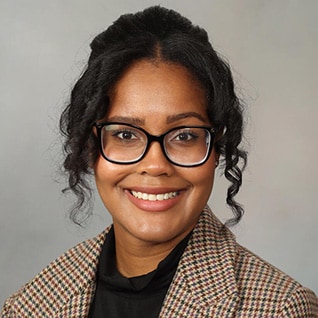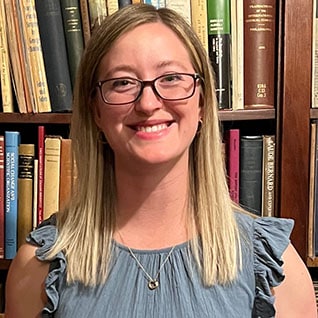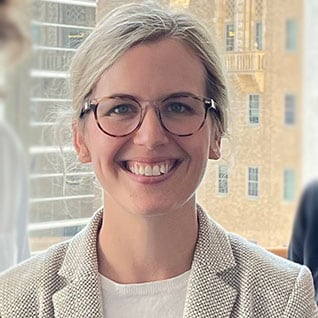Meet Our Fellows
The Nurse Practitioner or Physician Assistant Gastroenterology and Hepatology Fellowship accepts up to two fellows per year. Learn more about some of our current and past fellows, what led them to Mayo Clinic, and their thoughts and experiences in the program.
 Lauren Adams-Sanantonio, APRN, C.N.P., D.N.P.
Lauren Adams-Sanantonio, APRN, C.N.P., D.N.P.
What led you to pursue a post-graduate fellowship?
I decided to pursue a post-graduate fellowship for many reasons. I have had lots of exposure to the world of gastroenterology throughout my life. My father was diagnosed with colorectal cancer and underwent the necessary surgical interventions for that, and I have had my own GI concerns throughout the years. I think as a patient and having a parent with colon cancer, I gained a lot of insight into certain aspects of gastroenterology which helped shape the way I provided care as a nurse. Prior to starting NP school, I was diagnosed with idiopathic gastroparesis and spent lots of time in the Gastroenterology department and various endoscopy suites. As a patient and as a curious nurse I became more interested in research and understanding my gastroparesis diagnosis and simultaneously I developed an interest in motility disorders . In my final year of my DNP program, I had the option to select a specialty clinic and I selected GI. It was by that point that I knew GI was the specialty for me. However, instead of immediately looking for a GI position, I decided to seek out a fellowship to enhance my knowledge of GI conditions and build upon my assessment and diagnostic skills for the betterment of my future patients. I found the Mayo Clinic Gastroenterology and Hepatology NP/PA Fellowship and was intrigued by the different opportunities embedded in the program. It was an easy decision to make because I was once a member of the Mayo Clinic family in the past as an ICU nurse, working in the Medical/Surgical Transplant ICU, so I knew in advance the quality and care that Mayo Clinic provided. The rest is history!
What have you enjoyed most about the fellowship?
There have been many experiences that I have enjoyed throughout my time in the fellowship. For one, I have had the opportunity to work alongside some of the greatest minds in the field of Gastroenterology and Hepatology, which has been one of the biggest privileges! I have also had the opportunity to work with and understand the roles and contributions of all of the team members within the department (nutritionists, dieticians, endoscopists, surgeons, radiologists, GI psychiatry, physical therapists, nurses), and so much more. If I had to choose one of my favorite experiences thus far, I would have to say that being able to participate in research was very exciting for me. I focused my research on gastroparesis and throughout the process I worked with one of the expert motility faculty members to mentor me along the way. We are hoping to get our work published, and the entire process has been worth the work.
 Abby Webb, P.A.-C.
Abby Webb, P.A.-C.
What led you to pursue a post-graduate fellowship?
My search for a gastroenterology position in a PA-friendly state is what ultimately led me to Mayo Clinic's NPPA Gastroenterology and Hepatology Fellowship website. I am so glad I took a chance and applied. It just took one conversation with the program leaders to know it was right for me. A huge benefit of fellowship is that it offers more time to ease into the lifelong job, and you get to keep learning in a somewhat protected space.
What do you love most about this program and what makes the fellowship unique?
As cliché as it sounds, the best part of the GIH fellowship was the opportunity to work with so many great people. In this fellowship, you get to rotate through so many clinics and work with so many different providers, it is such a great opportunity to witness how each consultant evaluates and manages GI conditions.
I also learned a ton from the nursing staff, administration, leadership, and other clinical support members about the administration side of medicine — like how to navigate EMRs, find clinical resources for patients, and how to set boundaries to protect work-life balance. With any rotational program, you have to expect frequent change and learn how to adapt, but the quality of instruction throughout the program was consistent, and I think that makes this specific fellowship program really strong.
 Courtney Batra, APRN, C.N.P., D.N.P.
Courtney Batra, APRN, C.N.P., D.N.P.
How did our fellowship program prepare you to practice in GIH?
The NPPA fellowship provided me with the foundation to start and feel confident moving forward as a GIH nurse practitioner. It allowed me to not only build confidence in disease processes and treatment, but also in talking with patients and colleagues. As a current GIH nurse practitioner, I continuously go back to my fellowship training to help guide my decision-making and how to best proceed.
How did the fellowship impact your transition into clinical practice?
I started the fellowship after finishing my DNP program in family medicine. I do think it would have been extremely difficult to go straight into practice, especially a specialty practice without some additional training. The fellowship provided guidance and support as I learned the more detailed functions of clinical and hospital settings. This allowed me to consider both clinic and inpatient options moving forward after fellowship completion. With the background of the fellowship, I was able to focus on the nuances of the facility and my practice rather than trying to learn the concepts and disease processes making the transition into clinical practice seamless.
Why did you choose to pursue a post-graduate fellowship?
I chose to pursue a postgraduate fellowship to expand my knowledge base regarding a specific focus. Prior to the fellowship, I did have experience with GI as an endoscopy nurse, and the fellowship allowed me to expand and deepen my GI knowledge to truly understand the disease and how to approach the patient. The fellowship was also a great way to be exposed to research-based care, and how important it is to advance the medical field. The fellowship always allowed time for educational opportunities, I was able to attend one GIH conference during my time as well.
What did you enjoy most about the fellowship?
I really enjoyed getting to know all the people during the fellowship — physicians, APPs, and fellows involved directly with GI, as well as proceduralists, nursing staff, clinical staff, and patients. Everyone was very nice, but more importantly, all seemed very invested in doing the best for the patient. Everyone was very supportive and willing to help when needed, but also challenged me to develop and hone my knowledge and clinical skills. I look back fondly on my time during this fellowship and encourage anyone considering GIH especially to explore this option.